I write for those women who do not speak, for those who do not have a voice because they were so terrified, because we are taught to respect fear more than ourselves. We’ve been taught that silence would save us, but it won’t. – Audre Lorde
March, among other things, is women’s history month – and we here at the Book Club Resource love our women authors collection. We have over 527 women authors represented in the collection – that is 36 more than the male author representation. What makes our collection so exciting is that these women created works run the gamut of topics, genres, and epochs. We cannot do more than scratch the surface of the world of delights in the collection, but here are a handful of amazing titles to get you started on your path to greater appreciation of female authors and their works. For a complete list of the works by women authors in our collection, see our woman author list in the Book Club Resource catalog.
Fiction:
Dancer Dawkins & the California Kid (Willyce Kim)
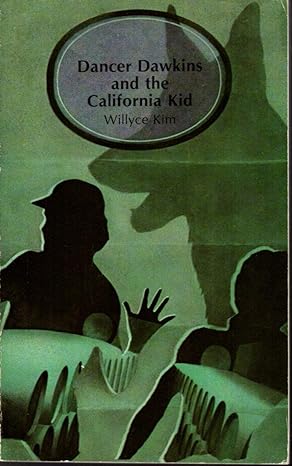 The most unusual lesbian novel of the year (1985). And the most politically incorrect. Dancer Dawkins views life best from behind a pile of hotcakes. But her lover, Jessica Riggins, has fallen into the clutches of Fatin Satin Aspen, the insidious leader of Violia Vincente’s Venerable Brigade. Something has to be done. Meanwhile, Little Willie Guthrie of Bangor, Maine, renames herself The California Kid, stocks up on Rubbles Dubble bubble gum and her father’s best Havana cigars and heads west. When this crew collides in San Francisco, what can be expected? Just about everything.
The most unusual lesbian novel of the year (1985). And the most politically incorrect. Dancer Dawkins views life best from behind a pile of hotcakes. But her lover, Jessica Riggins, has fallen into the clutches of Fatin Satin Aspen, the insidious leader of Violia Vincente’s Venerable Brigade. Something has to be done. Meanwhile, Little Willie Guthrie of Bangor, Maine, renames herself The California Kid, stocks up on Rubbles Dubble bubble gum and her father’s best Havana cigars and heads west. When this crew collides in San Francisco, what can be expected? Just about everything.
Lessons in Chemistry (Bonnie Garmus)
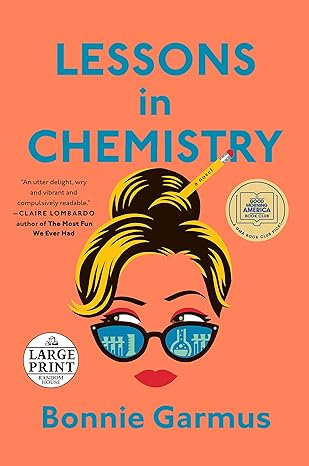 Chemist Elizabeth Zott is not your average woman. In fact, Elizabeth Zott would be the first to point out that there is no such thing as an average woman. But it’s the early 1960s and her all-male team at Hastings Research Institute takes a very unscientific view of equality. Except for one: Calvin Evans; the lonely, brilliant, Nobel–prize nominated grudge-holder who falls in love with—of all things—her mind. True chemistry results. But like science, life is unpredictable. Which is why a few years later Elizabeth Zott finds herself not only a single mother, but the reluctant star of America’s most beloved cooking show Supper at Six. Elizabeth’s unusual approach to cooking (“combine one tablespoon acetic acid with a pinch of sodium chloride”) proves revolutionary. But as her following grows, not everyone is happy. Because as it turns out, Elizabeth Zott isn’t just teaching women to cook. She’s daring them to change the status quo.
Chemist Elizabeth Zott is not your average woman. In fact, Elizabeth Zott would be the first to point out that there is no such thing as an average woman. But it’s the early 1960s and her all-male team at Hastings Research Institute takes a very unscientific view of equality. Except for one: Calvin Evans; the lonely, brilliant, Nobel–prize nominated grudge-holder who falls in love with—of all things—her mind. True chemistry results. But like science, life is unpredictable. Which is why a few years later Elizabeth Zott finds herself not only a single mother, but the reluctant star of America’s most beloved cooking show Supper at Six. Elizabeth’s unusual approach to cooking (“combine one tablespoon acetic acid with a pinch of sodium chloride”) proves revolutionary. But as her following grows, not everyone is happy. Because as it turns out, Elizabeth Zott isn’t just teaching women to cook. She’s daring them to change the status quo.
Horror:
Crank (Ellen Hopkins)
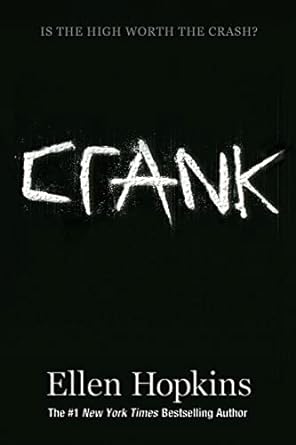 In Crank, Ellen Hopkins chronicles the turbulent and often disturbing relationship between Kristina, a character based on her own daughter, and the “monster,” the highly addictive drug crystal meth, or “crank.” Kristina is introduced to the drug while visiting her largely absent and ne’er-do-well father. While under the influence of the monster, Kristina discovers her sexy alter-ego, Bree: “there is no perfect daughter, / no gifted high school junior, / no Kristina Georgia Snow. / There is only Bree.” Bree will do all the things good girl Kristina won’t, including attracting the attention of dangerous boys who can provide her with a steady flow of crank.
In Crank, Ellen Hopkins chronicles the turbulent and often disturbing relationship between Kristina, a character based on her own daughter, and the “monster,” the highly addictive drug crystal meth, or “crank.” Kristina is introduced to the drug while visiting her largely absent and ne’er-do-well father. While under the influence of the monster, Kristina discovers her sexy alter-ego, Bree: “there is no perfect daughter, / no gifted high school junior, / no Kristina Georgia Snow. / There is only Bree.” Bree will do all the things good girl Kristina won’t, including attracting the attention of dangerous boys who can provide her with a steady flow of crank.
Haunting of Hill House (Shirley Jackson)
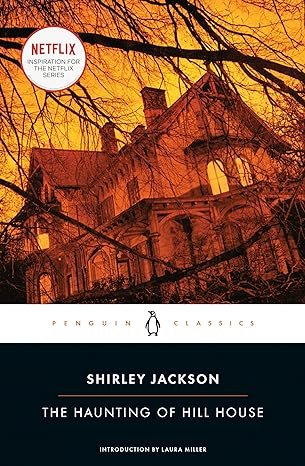 Dr. Montague, a scientific investigator of ghostly phenomena, has chosen to live for several weeks at Hill House, by repute a place of horror that will brook no human habitation. To check and contribute to his observations, he selects three companions previously unknown to him; two girls, Theo and Eleanor, and Luke, a young man, who is heir to Hill House. What happens cannot, in fairness, be told. But Dr Montague’s words were ‘A ghost cannot hurt anyone; only the fear of ghosts can be dangerous.’ Whether the ghosts at Hill House caused the fear, or the fear created the ghosts, there were such manifestations as to produce, finally, an ultimate terror that was all too palpable and down-to-earth.
Dr. Montague, a scientific investigator of ghostly phenomena, has chosen to live for several weeks at Hill House, by repute a place of horror that will brook no human habitation. To check and contribute to his observations, he selects three companions previously unknown to him; two girls, Theo and Eleanor, and Luke, a young man, who is heir to Hill House. What happens cannot, in fairness, be told. But Dr Montague’s words were ‘A ghost cannot hurt anyone; only the fear of ghosts can be dangerous.’ Whether the ghosts at Hill House caused the fear, or the fear created the ghosts, there were such manifestations as to produce, finally, an ultimate terror that was all too palpable and down-to-earth.
Memoir:
Crazy Brave : A Memoir (Joy Harjo)
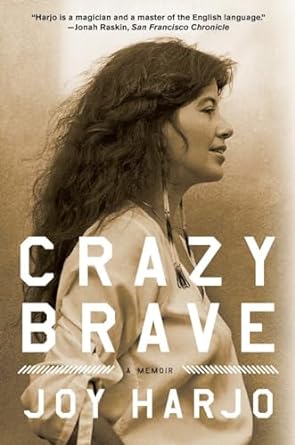 In this transcendent memoir, grounded in tribal myth and ancestry, music and poetry, Joy Harjo, one of our leading Native American voices, details her journey to becoming a poet. Born in Oklahoma, the end place of the Trail of Tears, Harjo grew up learning to dodge an abusive stepfather by finding shelter in her imagination, a deep spiritual life, and connection with the natural world. She attended an Indian arts boarding school, where she nourished an appreciation for painting, music, and poetry; gave birth while still a teenager; and struggled on her own as a single mother, eventually finding her poetic voice. Narrating the complexities of betrayal and love, Crazy Brave is a memoir about family and the breaking apart necessary in finding a voice. Harjo’s tale of a hardscrabble youth, young adulthood, and transformation into an award-winning poet and musician is haunting, unique, and visionary.
In this transcendent memoir, grounded in tribal myth and ancestry, music and poetry, Joy Harjo, one of our leading Native American voices, details her journey to becoming a poet. Born in Oklahoma, the end place of the Trail of Tears, Harjo grew up learning to dodge an abusive stepfather by finding shelter in her imagination, a deep spiritual life, and connection with the natural world. She attended an Indian arts boarding school, where she nourished an appreciation for painting, music, and poetry; gave birth while still a teenager; and struggled on her own as a single mother, eventually finding her poetic voice. Narrating the complexities of betrayal and love, Crazy Brave is a memoir about family and the breaking apart necessary in finding a voice. Harjo’s tale of a hardscrabble youth, young adulthood, and transformation into an award-winning poet and musician is haunting, unique, and visionary.
Small Fry : A Memoir (Lisa Brennan-Jobs)
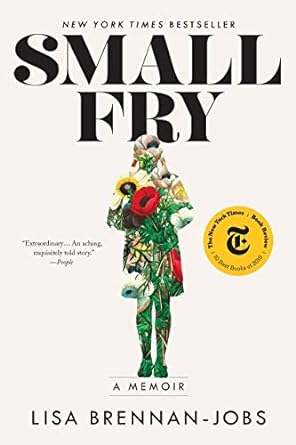 Born on a farm and named in a field by her parents–artist Chrisann Brennan and Steve Jobs–Lisa Brennan-Jobs’ childhood unfolded in a rapidly changing Silicon Valley. When she was young, Lisa’s father was a mythical figure who was rarely present in her life. As she grew older, her father took an interest in her, ushering her into a new world of mansions, vacations, and private schools. His attention was thrilling, but he could also be cold, critical and unpredictable. When her relationship with her mother grew strained in high school, Lisa decided to move in with her father, hoping he’d become the parent she’d always wanted him to be. Small Fry is Lisa Brennan-Jobs’ poignant story of a childhood spent between two imperfect but extraordinary homes. Scrappy, wise, and funny, young Lisa is an unforgettable guide through her parents’ fascinating and disparate worlds. Part portrait of a complex family, part love letter to California in the seventies and eighties, Small Fry is an enthralling book by an insightful new literary voice.
Born on a farm and named in a field by her parents–artist Chrisann Brennan and Steve Jobs–Lisa Brennan-Jobs’ childhood unfolded in a rapidly changing Silicon Valley. When she was young, Lisa’s father was a mythical figure who was rarely present in her life. As she grew older, her father took an interest in her, ushering her into a new world of mansions, vacations, and private schools. His attention was thrilling, but he could also be cold, critical and unpredictable. When her relationship with her mother grew strained in high school, Lisa decided to move in with her father, hoping he’d become the parent she’d always wanted him to be. Small Fry is Lisa Brennan-Jobs’ poignant story of a childhood spent between two imperfect but extraordinary homes. Scrappy, wise, and funny, young Lisa is an unforgettable guide through her parents’ fascinating and disparate worlds. Part portrait of a complex family, part love letter to California in the seventies and eighties, Small Fry is an enthralling book by an insightful new literary voice.
Poetry:
Ariel (Sylvia Plath)
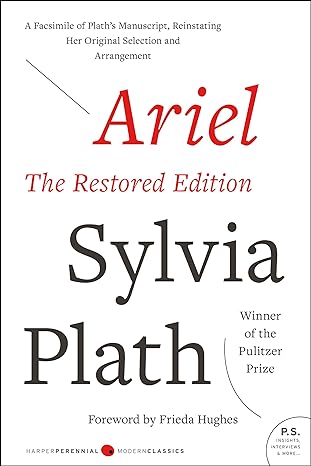 When Sylvia Plath died, she not only left behind a prolific life but also her unpublished literary masterpiece, Ariel. When her husband, Ted Hughes, first brought this collection to the public, it garnered worldwide acclaim, but it wasn’t the draft Sylvia had wanted her readers to see. This facsimile edition restores, for the first time, Plath’s original manuscript—including handwritten notes—and her own selection and arrangement of poems. This edition also includes in facsimile the complete working drafts of her poem “Ariel,” which provide a rare glimpse into the creative process of a beloved writer. This publication introduces a truer version of Plath’s works, and will alter her legacy forever.
When Sylvia Plath died, she not only left behind a prolific life but also her unpublished literary masterpiece, Ariel. When her husband, Ted Hughes, first brought this collection to the public, it garnered worldwide acclaim, but it wasn’t the draft Sylvia had wanted her readers to see. This facsimile edition restores, for the first time, Plath’s original manuscript—including handwritten notes—and her own selection and arrangement of poems. This edition also includes in facsimile the complete working drafts of her poem “Ariel,” which provide a rare glimpse into the creative process of a beloved writer. This publication introduces a truer version of Plath’s works, and will alter her legacy forever.
Milk and Honey (Rupi Kaur)
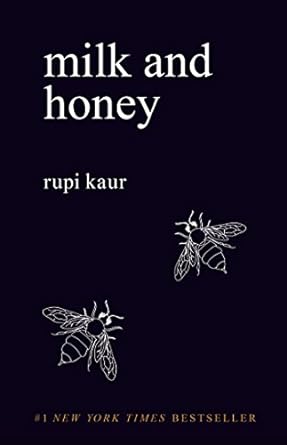 The book is divided into four chapters, and each chapter serves a different purpose. Deals with a different pain. Heals a different heartache. milk and honey takes readers through a journey of the most bitter moments in life and finds sweetness in them because there is sweetness everywhere if you are just willing to look.
The book is divided into four chapters, and each chapter serves a different purpose. Deals with a different pain. Heals a different heartache. milk and honey takes readers through a journey of the most bitter moments in life and finds sweetness in them because there is sweetness everywhere if you are just willing to look.
Short Stories:
The Complete Stories (Flannery O’Connor)
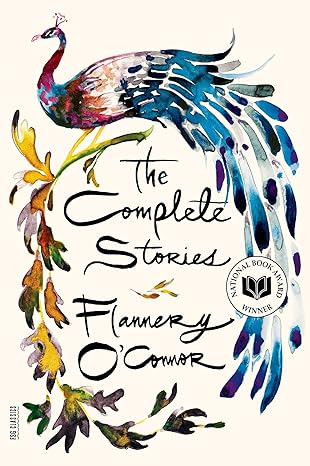 There are thirty-one stories here in all, including twelve that do not appear in the only two story collections O’Connor put together in her short lifetime–Everything That Rises Must Converge and A Good Man Is Hard to Find. O’Connor published her first story, “The Geranium,” in 1946, while she was working on her master’s degree at the University of Iowa. Arranged chronologically, this collection shows that her last story, “Judgement Day”–sent to her publisher shortly before her death―is a brilliantly rewritten and transfigured version of “The Geranium.” Taken together, these stories reveal a lively, penetrating talent that has given us some of the most powerful and disturbing fiction of the twentieth century. Also included is an introduction by O’Connor’s longtime editor and friend, Robert Giroux.
There are thirty-one stories here in all, including twelve that do not appear in the only two story collections O’Connor put together in her short lifetime–Everything That Rises Must Converge and A Good Man Is Hard to Find. O’Connor published her first story, “The Geranium,” in 1946, while she was working on her master’s degree at the University of Iowa. Arranged chronologically, this collection shows that her last story, “Judgement Day”–sent to her publisher shortly before her death―is a brilliantly rewritten and transfigured version of “The Geranium.” Taken together, these stories reveal a lively, penetrating talent that has given us some of the most powerful and disturbing fiction of the twentieth century. Also included is an introduction by O’Connor’s longtime editor and friend, Robert Giroux.
Yellow Wall Paper and Other Stories of Liberation (Charlotte Perkins Gilman et.at.)
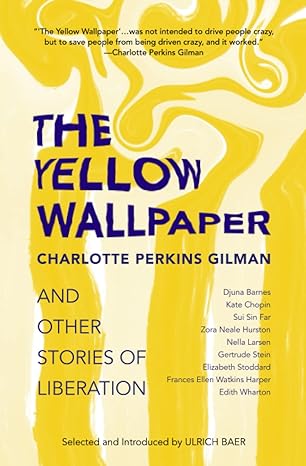 Charlotte Perkins Gilman’s short story “The Yellow Wallpaper” is one of the key texts in American women’s fiction and also a rallying cry for feminism. Since its original printing in 1892, it has been routinely anthologized in collections of women’s literature, American literature, and textbooks. This volume gathers nine other equally momentous stories by a diverse group of renowned American women authors who changed the world with their compelling tales. These ten stories testify to the power of the imagination to create personal transformation and political change. Other contributions include: Djuna Barnes, Kate Chopin, Sui Sin Far, Zora Neale Hurston, Nella Larsen, Gertrude Stein, Elizabeth Stoddard, Frances Ellen Watkins Harper, Edith Wharton.
Charlotte Perkins Gilman’s short story “The Yellow Wallpaper” is one of the key texts in American women’s fiction and also a rallying cry for feminism. Since its original printing in 1892, it has been routinely anthologized in collections of women’s literature, American literature, and textbooks. This volume gathers nine other equally momentous stories by a diverse group of renowned American women authors who changed the world with their compelling tales. These ten stories testify to the power of the imagination to create personal transformation and political change. Other contributions include: Djuna Barnes, Kate Chopin, Sui Sin Far, Zora Neale Hurston, Nella Larsen, Gertrude Stein, Elizabeth Stoddard, Frances Ellen Watkins Harper, Edith Wharton.
Mystery:
Better Man (Louise Penny)
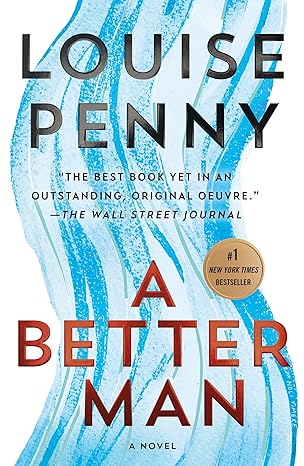 It’s Gamache’s first day back as head of the homicide department, a job he temporarily shares with his previous second-in-command, Jean-Guy Beauvoir. Flood waters are rising across the province. In the middle of the turmoil a father approaches Gamache, pleading for help in finding his daughter. As crisis piles upon crisis, Gamache tries to hold off the encroaching chaos, and realizes the search for Vivienne Godin should be abandoned. But with a daughter of his own, he finds himself developing a profound, and perhaps unwise, empathy for her distraught father. Increasingly hounded by the question, how would you feel…, he resumes the search. As the rivers rise, and the social media onslaught against Gamache becomes crueler, a body is discovered. And in the tumult, mistakes are made. In the next novel in this “constantly surprising series that deepens and darkens as it evolves” (New York Times Book Review), Gamache must face a horrific possibility, and a burning question. What would you do if your child’s killer walked free?
It’s Gamache’s first day back as head of the homicide department, a job he temporarily shares with his previous second-in-command, Jean-Guy Beauvoir. Flood waters are rising across the province. In the middle of the turmoil a father approaches Gamache, pleading for help in finding his daughter. As crisis piles upon crisis, Gamache tries to hold off the encroaching chaos, and realizes the search for Vivienne Godin should be abandoned. But with a daughter of his own, he finds himself developing a profound, and perhaps unwise, empathy for her distraught father. Increasingly hounded by the question, how would you feel…, he resumes the search. As the rivers rise, and the social media onslaught against Gamache becomes crueler, a body is discovered. And in the tumult, mistakes are made. In the next novel in this “constantly surprising series that deepens and darkens as it evolves” (New York Times Book Review), Gamache must face a horrific possibility, and a burning question. What would you do if your child’s killer walked free?
Truly Devious (Maureen Johnson)
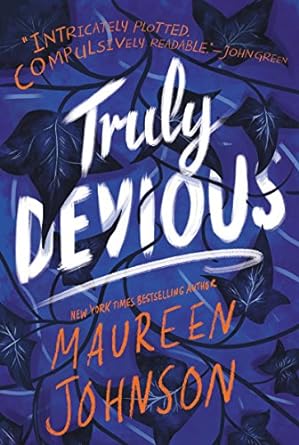 Ellingham Academy is a famous private school in Vermont for the brightest thinkers, inventors, and artists. It was founded by Albert Ellingham, an early twentieth century tycoon, who wanted to make a wonderful place full of riddles, twisting pathways, and gardens. “A place,” he said, “where learning is a game.”
Ellingham Academy is a famous private school in Vermont for the brightest thinkers, inventors, and artists. It was founded by Albert Ellingham, an early twentieth century tycoon, who wanted to make a wonderful place full of riddles, twisting pathways, and gardens. “A place,” he said, “where learning is a game.”
Shortly after the school opened, his wife and daughter were kidnapped. The only real clue was a mocking riddle listing methods of murder, signed with the frightening pseudonym “Truly, Devious.” It became one of the great unsolved crimes of American history.
True-crime aficionado Stevie Bell is set to begin her first year at Ellingham Academy, and she has an ambitious plan: She will solve this cold case. That is, she will solve the case when she gets a grip on her demanding new school life and her housemates: the inventor, the novelist, the actor, the artist, and the jokester.
But something strange is happening. Truly Devious makes a surprise return, and death revisits Ellingham Academy. The past has crawled out of its grave. Someone has gotten away with murder.
Historical Fiction:
Daughters of the Night Sky (Amie K Runyan)
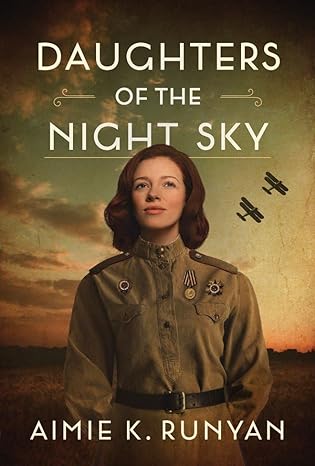 Russia, 1941. Katya Ivanova is a young pilot in a far-flung military academy in the Ural Mountains. From childhood, she’s dreamed of taking to the skies to escape her bleak mountain life. With the Nazis on the march across Europe, she is called on to use her wings to serve her country in its darkest hour. Not even the entreaties of her new husband―a sensitive artist who fears for her safety―can dissuade her from doing her part as a proud daughter of Russia.
Russia, 1941. Katya Ivanova is a young pilot in a far-flung military academy in the Ural Mountains. From childhood, she’s dreamed of taking to the skies to escape her bleak mountain life. With the Nazis on the march across Europe, she is called on to use her wings to serve her country in its darkest hour. Not even the entreaties of her new husband―a sensitive artist who fears for her safety―can dissuade her from doing her part as a proud daughter of Russia.
After years of arduous training, Katya is assigned to the 588th Night Bomber Regiment―one of the only Soviet air units composed entirely of women. The Germans quickly learn to fear nocturnal raids by the daring fliers they call “Night Witches.” But the brutal campaign will exact a bitter toll on Katya and her sisters-in-arms. When the smoke of war clears, nothing will ever be the same―and one of Russia’s most decorated military heroines will face the most agonizing choice of all.
My Heart Lies Here (Laurie Marr Wasmund)
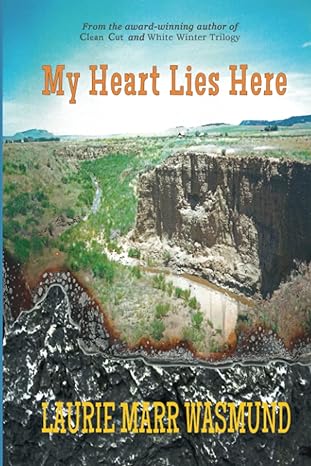 In 1913, the United Mine Workers of America led a daring strike against John D. Rockefeller’s Colorado Fuel & Iron Company that would end in war. In this novel of the Ludlow Massacre, a young woman learns the true meaning of love, sacrifice, and what it means to be an American. Newly arrived in Colorado, Christian Scott is caught in a web of divided loyalties. Torn between her dedication to her brother, Alex, who clings to his proud Scottish heritage, and her love of Pearl, a spirited orphan whose flight from abuse and poverty lands her on the Scotts’ doorstep, Christian experiences heartbreak when the two become enemies. At the same time, she secretly joins with a passionate Greek miner on a dangerous course of resistance against the coal company and the brutal Colorado National Guard that threatens to destroy everything–and everyone–she loves.
In 1913, the United Mine Workers of America led a daring strike against John D. Rockefeller’s Colorado Fuel & Iron Company that would end in war. In this novel of the Ludlow Massacre, a young woman learns the true meaning of love, sacrifice, and what it means to be an American. Newly arrived in Colorado, Christian Scott is caught in a web of divided loyalties. Torn between her dedication to her brother, Alex, who clings to his proud Scottish heritage, and her love of Pearl, a spirited orphan whose flight from abuse and poverty lands her on the Scotts’ doorstep, Christian experiences heartbreak when the two become enemies. At the same time, she secretly joins with a passionate Greek miner on a dangerous course of resistance against the coal company and the brutal Colorado National Guard that threatens to destroy everything–and everyone–she loves.
Graphic Novels:
Fun Home : A Family Tragicomic (Alison Bechdel)
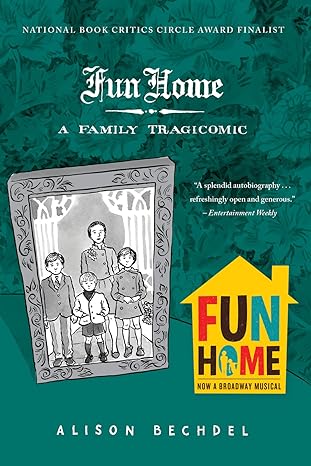 Distant and exacting, Bruce Bechdel was an English teacher and director of the town funeral home, which Alison and her family referred to as the “Fun Home.” It was not until college that Alison, who had recently come out as a lesbian, discovered that her father was also gay. A few weeks after this revelation, he was dead, leaving a legacy of mystery for his daughter to resolve. In her hands, personal history becomes a work of amazing subtlety and power, written with controlled force and enlivened with humor, rich literary allusion, and heartbreaking detail.
Distant and exacting, Bruce Bechdel was an English teacher and director of the town funeral home, which Alison and her family referred to as the “Fun Home.” It was not until college that Alison, who had recently come out as a lesbian, discovered that her father was also gay. A few weeks after this revelation, he was dead, leaving a legacy of mystery for his daughter to resolve. In her hands, personal history becomes a work of amazing subtlety and power, written with controlled force and enlivened with humor, rich literary allusion, and heartbreaking detail.
Grass (Keum Suk Gendry-Kim)
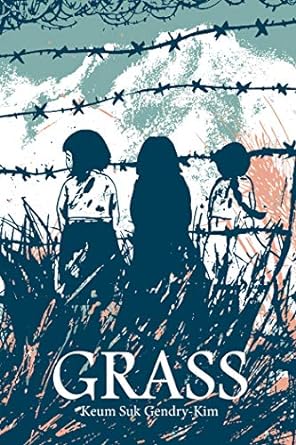 Grass is a powerful antiwar graphic novel, telling the life story of a Korean girl named Okseon Lee who was forced into sexual slavery for the Japanese Imperial Army during the Second World War―a disputed chapter in twentieth-century Asian history. Beginning in Lee’s childhood, Grass shows the lead-up to the war from a child’s vulnerable perspective, detailing how one person experienced the Japanese occupation and the widespread suffering it entailed for ordinary Koreans. Keum Suk Gendry-Kim emphasizes Lee’s strength in overcoming the many forms of adversity she experienced. Grass is painted in a black ink that flows with lavish details of the beautiful fields and farmland of Korea and uses heavy brushwork on the somber interiors of Lee’s memories. The cartoonist Gendry-Kim’s interviews with Lee become an integral part of Grass, forming the heart and architecture of this powerful nonfiction graphic novel and offering a holistic view of how Lee’s wartime suffering changed her. Grass is a landmark graphic novel that makes personal the desperate cost of war and the importance of peace.
Grass is a powerful antiwar graphic novel, telling the life story of a Korean girl named Okseon Lee who was forced into sexual slavery for the Japanese Imperial Army during the Second World War―a disputed chapter in twentieth-century Asian history. Beginning in Lee’s childhood, Grass shows the lead-up to the war from a child’s vulnerable perspective, detailing how one person experienced the Japanese occupation and the widespread suffering it entailed for ordinary Koreans. Keum Suk Gendry-Kim emphasizes Lee’s strength in overcoming the many forms of adversity she experienced. Grass is painted in a black ink that flows with lavish details of the beautiful fields and farmland of Korea and uses heavy brushwork on the somber interiors of Lee’s memories. The cartoonist Gendry-Kim’s interviews with Lee become an integral part of Grass, forming the heart and architecture of this powerful nonfiction graphic novel and offering a holistic view of how Lee’s wartime suffering changed her. Grass is a landmark graphic novel that makes personal the desperate cost of war and the importance of peace.
Self Help:
Girl, Wash Your Face : Stop Believing the Lies About Who You Are so You Can Become Who You Were Meant to Be (Rachel Hollis)
If you have ever said any of these things to yourself . . .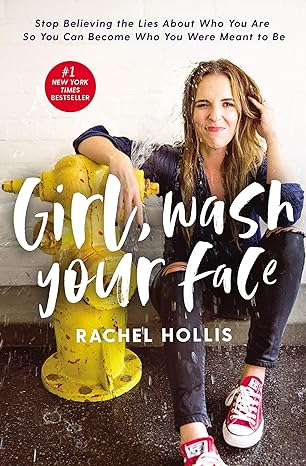
- Something else will make me happy.
- I’m not a good mom.
- I will never get past this.
- I am defined by my weight.
- I should be further along by now.
. . . then you could benefit from the unflinching faith and rock-hard tenacity Rachel Hollis has in store for you. In this challenging but conversational book, Rachel exposes the twenty lies and misconceptions that too often hold us back from living joyfully and productively, lies we’ve told ourselves so often we don’t even hear them anymore.
Rachel is real and talks about real issues. More than that, she reveals the specific practical strategies that helped her move past them. In the process, she encourages, entertains, and even kicks a little butt, all to convince you to do whatever it takes to get real and become the joyous, confident woman you were meant to be. Because you really can live with passion and hustle – and give yourself grace without giving up.
Scout Mindset : Why Some People See Things Clearly and Others Don’t (Julia Galef)
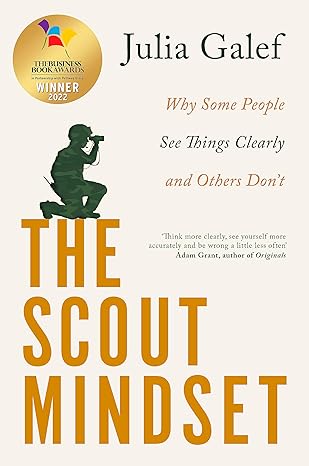 When it comes to what we believe, humans see what they want to see. In other words, we have what Julia Galef calls a ‘soldier’ mindset. From tribalism and wishful thinking, to rationalizing in our personal lives and everything in between, we are driven to defend the ideas we most want to believe – and shoot down those we don’t. But if we want to get things right more often we should train ourselves to think more like a scout. Unlike the soldier, a scout’s goal isn’t to defend one side over the other. It’s to go out, survey the territory, and come back with as accurate a map as possible. Regardless of what they hope to be the case, above all, the scout wants to know what’s actually true.
When it comes to what we believe, humans see what they want to see. In other words, we have what Julia Galef calls a ‘soldier’ mindset. From tribalism and wishful thinking, to rationalizing in our personal lives and everything in between, we are driven to defend the ideas we most want to believe – and shoot down those we don’t. But if we want to get things right more often we should train ourselves to think more like a scout. Unlike the soldier, a scout’s goal isn’t to defend one side over the other. It’s to go out, survey the territory, and come back with as accurate a map as possible. Regardless of what they hope to be the case, above all, the scout wants to know what’s actually true.
In The Scout Mindset, Galef shows that what makes scouts better at getting things right isn’t that they’re smarter or more knowledgeable than everyone else. It’s a handful of emotional skills, habits, and ways of looking at the world – which anyone can learn. With fascinating examples ranging from how to survive being stranded in the middle of the ocean, to how Jeff Bezos avoids overconfidence, to how super forecasters outperform CIA operatives, to Reddit threads and modern partisan politics, Galef explores why our brains deceive us and what we can do to change the way we think.
Non-Fiction:
Blowout : Corrupted Democracy, Rogue State Russia, and the Richest, Most Destructive Industry on Earth (Rachel Maddow)
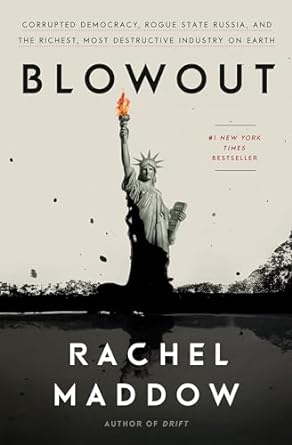 In 2010, the words “earthquake swarm” entered the lexicon in Oklahoma. That same year, a trove of Michael Jackson memorabilia—including his iconic crystal-encrusted white glove—was sold at auction for over $1 million to a guy who was, officially, just the lowly forestry minister of the tiny nation of Equatorial Guinea. And in 2014, revolutionaries in Ukraine raided the palace of their ousted president and found a zoo of peacocks, gilded toilets, and a floating restaurant modeled after a Spanish galleon. Unlikely as it might seem, there is a thread connecting these events, and Rachel Maddow follows it to its crooked source: the unimaginably lucrative and equally corrupting oil and gas industry.
In 2010, the words “earthquake swarm” entered the lexicon in Oklahoma. That same year, a trove of Michael Jackson memorabilia—including his iconic crystal-encrusted white glove—was sold at auction for over $1 million to a guy who was, officially, just the lowly forestry minister of the tiny nation of Equatorial Guinea. And in 2014, revolutionaries in Ukraine raided the palace of their ousted president and found a zoo of peacocks, gilded toilets, and a floating restaurant modeled after a Spanish galleon. Unlikely as it might seem, there is a thread connecting these events, and Rachel Maddow follows it to its crooked source: the unimaginably lucrative and equally corrupting oil and gas industry.
With her trademark black humor, Maddow takes us on a switchback journey around the globe, revealing the greed and incompetence of Big Oil and Gas along the way, and drawing a surprising conclusion about why the Russian government hacked the 2016 U.S. election. She deftly shows how Russia’s rich reserves of crude have, paradoxically, stunted its growth, forcing Vladimir Putin to maintain his power by spreading Russia’s rot into its rivals, its neighbors, the West’s most important alliances, and the United States. Chevron, BP, and a host of other industry players get their star turn, most notably ExxonMobil and the deceptively well-behaved Rex Tillerson. The oil and gas industry has weakened democracies in developed and developing countries, fouled oceans and rivers, and propped up authoritarian thieves and killers. But being outraged at it is, according to Maddow, “like being indignant when a lion takes down and eats a gazelle. You can’t really blame the lion. It’s in her nature.” Blowout is a call to contain the lion: to stop subsidizing the wealthiest businesses on earth, to fight for transparency, and to check the influence of the world’s most destructive industry and its enablers. The stakes have never been higher. As Maddow writes, “Democracy either wins this one or disappears.”
A Lady’s Life in the Rocky Mountains (Isabella L. Bird)
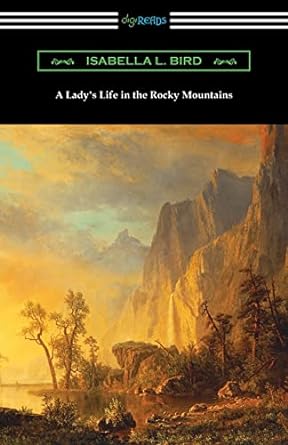 First published serially and then into a book in 1879, “A Lady’s Life in the Rocky Mountains” is one of the many accounts of Isabella L. Bird’s amazing travels and adventures. Born in Yorkshire, England in 1831, Bird was never formally educated and was often sickly as a child, but she was an avid reader and loved the outdoors. In 1854, at the age of twenty-two, she left a comfortable life in England for her first trip abroad to America. She fell in love with discovering new places and defied tradition while undertaking grand adventures as an unmarried woman. Bird went onto travel to Australia and Hawaii, while publishing several accounts of her experiences, before finding her way to Colorado. “A Lady’s Life in the Rocky Mountains”, her fourth publication and her most famous, contains the account of six months of her travels in 1873 through the rugged terrain of the Colorado Rockies. The book is based upon her colorful letters sent back home to her sister and the account relates the many hardships of the great western frontier, the unique characters she meets, and the incredible natural world she found in the newly settled western territories.
First published serially and then into a book in 1879, “A Lady’s Life in the Rocky Mountains” is one of the many accounts of Isabella L. Bird’s amazing travels and adventures. Born in Yorkshire, England in 1831, Bird was never formally educated and was often sickly as a child, but she was an avid reader and loved the outdoors. In 1854, at the age of twenty-two, she left a comfortable life in England for her first trip abroad to America. She fell in love with discovering new places and defied tradition while undertaking grand adventures as an unmarried woman. Bird went onto travel to Australia and Hawaii, while publishing several accounts of her experiences, before finding her way to Colorado. “A Lady’s Life in the Rocky Mountains”, her fourth publication and her most famous, contains the account of six months of her travels in 1873 through the rugged terrain of the Colorado Rockies. The book is based upon her colorful letters sent back home to her sister and the account relates the many hardships of the great western frontier, the unique characters she meets, and the incredible natural world she found in the newly settled western territories.
Essays:
Hood Feminism : Notes From the Women That a Movement Forgot (Mikki Kendall)
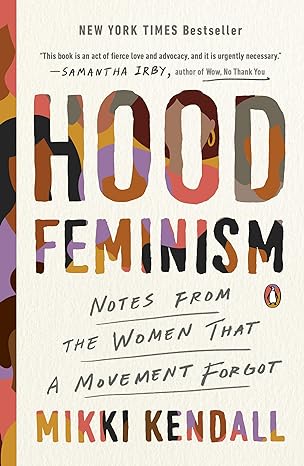 Today’s feminist movement has a glaring blind spot, and paradoxically, it is women. Mainstream feminists rarely talk about meeting basic needs as a feminist issue, argues Mikki Kendall, but food insecurity, access to quality education, safe neighborhoods, a living wage, and medical care are all feminist issues. All too often, however, the focus is not on basic survival for the many, but on increasing privilege for the few. That feminists refuse to prioritize these issues has only exacerbated the age-old problem of both internecine discord and women who rebuff at carrying the title. Moreover, prominent white feminists broadly suffer from their own myopia with regard to how things like race, class, sexual orientation, and ability intersect with gender. How can we stand in solidarity as a movement, Kendall asks, when there is the distinct likelihood that some women are oppressing others? In her searing collection of essays, Mikki Kendall takes aim at the legitimacy of the modern feminist movement, arguing that it has chronically failed to address the needs of all but a few women. Drawing on her own experiences with hunger, violence, and hypersexualization, along with incisive commentary on reproductive rights, politics, pop culture, the stigma of mental health, and more, Hood Feminism delivers an irrefutable indictment of a movement in flux. An unforgettable debut, Kendall has written a ferocious clarion call to all would-be feminists to live out the true mandate of the movement in thought and in deed.
Today’s feminist movement has a glaring blind spot, and paradoxically, it is women. Mainstream feminists rarely talk about meeting basic needs as a feminist issue, argues Mikki Kendall, but food insecurity, access to quality education, safe neighborhoods, a living wage, and medical care are all feminist issues. All too often, however, the focus is not on basic survival for the many, but on increasing privilege for the few. That feminists refuse to prioritize these issues has only exacerbated the age-old problem of both internecine discord and women who rebuff at carrying the title. Moreover, prominent white feminists broadly suffer from their own myopia with regard to how things like race, class, sexual orientation, and ability intersect with gender. How can we stand in solidarity as a movement, Kendall asks, when there is the distinct likelihood that some women are oppressing others? In her searing collection of essays, Mikki Kendall takes aim at the legitimacy of the modern feminist movement, arguing that it has chronically failed to address the needs of all but a few women. Drawing on her own experiences with hunger, violence, and hypersexualization, along with incisive commentary on reproductive rights, politics, pop culture, the stigma of mental health, and more, Hood Feminism delivers an irrefutable indictment of a movement in flux. An unforgettable debut, Kendall has written a ferocious clarion call to all would-be feminists to live out the true mandate of the movement in thought and in deed.
This Bridge Called My Back (Cherre Moraga & Gloria Anzalda -eds)
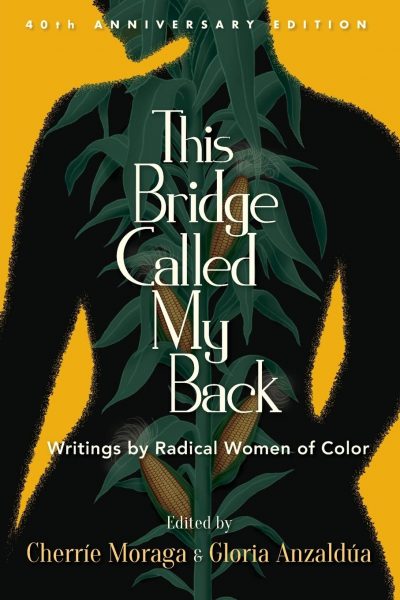 This groundbreaking collection reflects an uncompromised definition of feminism by women of color. Through personal essays, criticism, interviews, testimonials, poetry, and visual art, the collection explores, as coeditor Cherríe Moraga writes, “the complex confluence of identities—race, class, gender, and sexuality—systemic to women of color oppression and liberation.”
This groundbreaking collection reflects an uncompromised definition of feminism by women of color. Through personal essays, criticism, interviews, testimonials, poetry, and visual art, the collection explores, as coeditor Cherríe Moraga writes, “the complex confluence of identities—race, class, gender, and sexuality—systemic to women of color oppression and liberation.”
Honorable Mentions
Here are twenty more titles in the collection that capture women’s experiences or relate to feminism, in no particular order (links go to the catalog):
- Sabrina & Corina: Stories
- The Power
- Girl, Woman, Other
- The Women of Brewster Place
- An Uncertain Age: Poems by bold women of a certain age
- Amazons, Abolitionists, and Activists: A graphic history of women’s fight for their rights
- Capital Dames: The Civil War and the women of Washington, 1848-1868
- When Everything changed: The amazing journey of American women from 1960 to the present
- Reckonings: Contemporary short fiction by Native American women
- Rise of the Rocket Girls: The women who propelled us, from missiles to the moon to Mars
- The Radium Girls: The dark story of America’s shining women
- Hidden Figures: The American dream and the untold story of the Black women mathematicians who helped win the space race
- The Madwoman in the Attic: The woman writer and the nineteenth-century literary imagination
- The Selected Works of Audre Lorde
- Men Explain Things To Me
- Obsessive Genius: The inner world of Marie Curie
- Killing Rage: Ending racism
- Women Icons of the West: Five women who forged the American frontier
- Women Artists of the West: Five portraits in creativity and courage
- Women Writers of the West: Five Chroniclers of the American Frontier
***
Book club sets are circulated to participating libraries via the CLiC courier. If you are interested in receiving book club sets but are not already a member library, use the online form to get signed up. Since the BCR has always relied on book donations, we are deeply grateful to all of the institutions and individuals that have donated sets and helped make the collection stronger. Please contact bookclub@coloradovirtuallibrary.org for questions or to discuss donations. We also welcome all suggestions of titles to include in the collection.
*NOTE: All descriptions are adapted from goodreads.com and Amazon.com.
- Book Club Author Suggestion: Kristin Hannah - May 21, 2025
- Accessibility Quick Tip: Invitation from OIT - March 19, 2025
- Book Club Author Suggestion: John Green - February 12, 2025